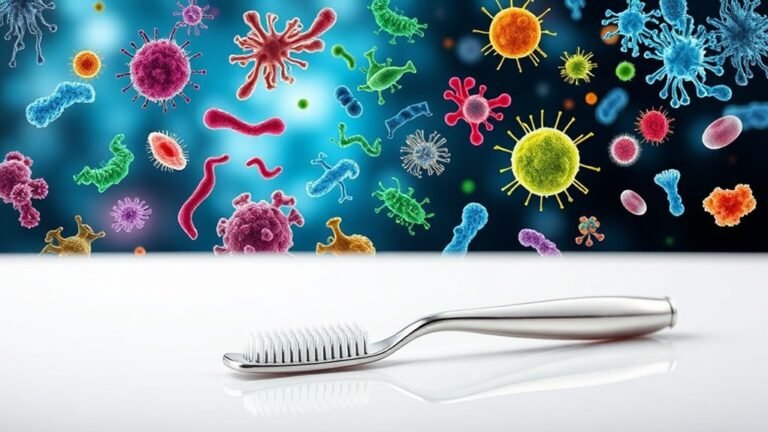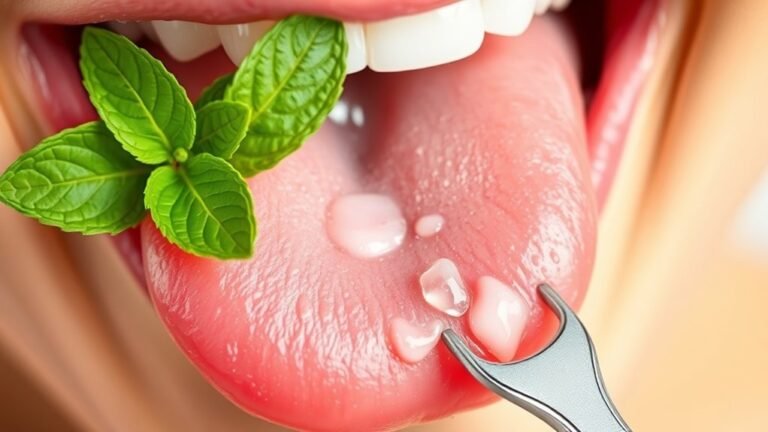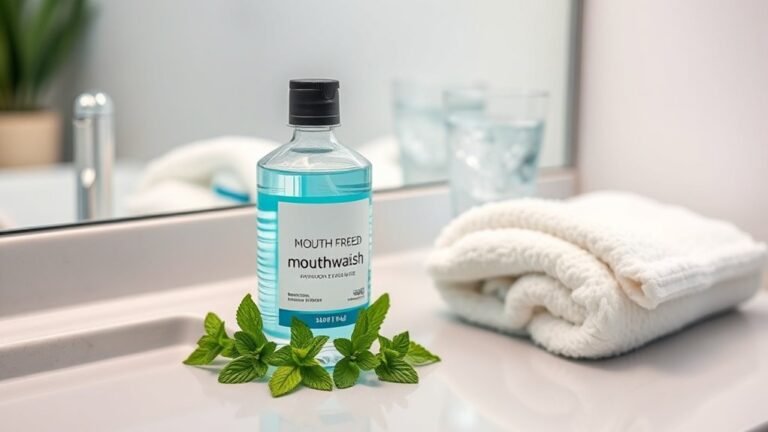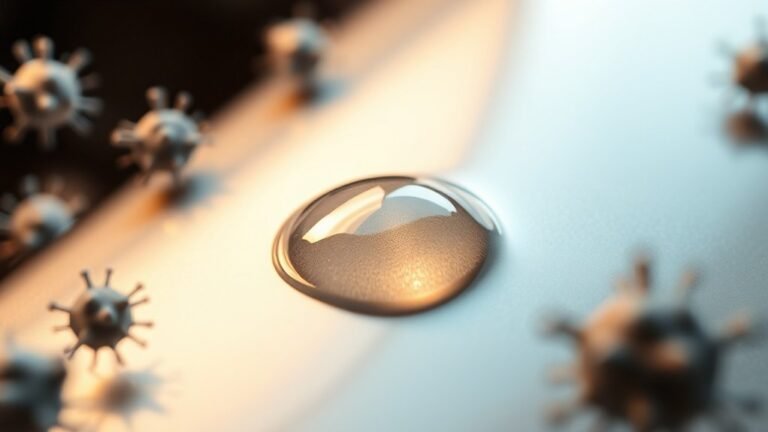How Do Dental Appliances Harbor Bacteria That Cause Bad Breath
Dental appliances can harbor bacteria that lead to bad breath because they trap food particles and promote plaque buildup. This creates an environment where bacteria thrive, especially if you neglect regular cleaning. The oral biofilm that forms on these appliances increases the risk of unpleasant odors and infections. To combat this, it’s essential to integrate cleaning routines into your daily oral care. Discover effective strategies for maintaining fresh breath with your dental appliances and improving overall oral health.
Key Takeaways
- Dental appliances trap food particles and bacteria, creating an environment conducive to bacterial growth.
- Oral biofilm forms on dental appliance surfaces, further promoting bacterial colonies that cause bad breath.
- Neglecting to clean dental appliances increases the risk of plaque buildup and gum disease.
- Bacteria break down trapped food remnants, leading to the production of unpleasant odors.
- Regular cleaning of dental appliances is essential to prevent halitosis and maintain oral hygiene.
Understanding Bad Breath and Its Causes
Bad breath, or halitosis, affects nearly 1 in 4 people at some point in their lives, and understanding its causes can help you tackle the issue effectively. One major contributor is bacteria that thrive in the mouth, often due to poor oral hygiene. When you neglect regular brushing and flossing, plaque buildup occurs, leading to gum disease and the unpleasant odors associated with bad breath. Dental appliances, such as braces or dentures, can also trap food particles and bacteria, exacerbating the problem if not cleaned properly. Maintaining good oral hygiene by brushing your teeth at least twice a day and using mouthwash can greatly reduce bacteria and plaque buildup, ultimately helping you combat bad breath effectively.
How Dental Appliances Create a Breeding Ground for Bacteria
While dental appliances can improve your oral health and function, they can also create an environment that fosters bacterial growth. Here’s how:
- Oral biofilm formation: Bacteria thrive on the surfaces of your dental appliances, forming a sticky biofilm that can lead to bacterial colonies.
- Bacterial infection risk: If not properly cleaned, these appliances can harbor harmful bacteria, increasing the risk of infections.
- Neglected oral care routine: Skipping regular cleaning of dental appliances allows bacteria to flourish, contributing to bad breath.
To combat these issues, prioritize cleaning dental appliances regularly and integrate them into your oral care routine. By doing so, you’ll minimize the risk of bacterial buildup and maintain fresher breath.
The Role of Food Particles and Plaque in Halitosis
Bacteria aren’t the only culprits behind halitosis; food particles and plaque also play a significant role. When you eat, tiny food particles can become trapped in your dental appliances and between your teeth. If you don’t maintain proper dental hygiene, these particles can lead to bacterial buildup. Dental plaque forms when these food particles mix with mouth bacteria, creating a sticky film on your teeth and appliances. This buildup can produce unpleasant breath odor as the bacteria break down the food remnants. Regularly cleaning your dental appliances and practicing good oral hygiene can help minimize plaque and food particles, reducing the risk of halitosis. Keep your mouth fresh by being proactive about your dental care.
Effective Cleaning Techniques for Dental Appliances
To guarantee your dental appliances remain clean and odor-free, it’s essential to adopt effective cleaning techniques. Regular mouth cleaning helps prevent halitosis and the buildup of bacterial biofilm that can lead to oral infections. Here are some key methods:
- Rinse your appliances daily with warm water to remove food particles.
- Use a soft-bristle toothbrush and non-abrasive cleaner to scrub your appliances thoroughly.
- Soak your appliances in a denture cleaner or a vinegar solution weekly for deep cleaning.
Tips for Maintaining Fresh Breath With Dental Appliances
Maintaining fresh breath with dental appliances is essential for your confidence and overall oral health. If you wear retainers or dentures, regular cleaning is imperative to control mouth odor and support a healthy oral microbiome. Rinse your appliances daily to remove food particles and bacteria. Consider using breath freshening solutions recommended by your dentist.
Incorporating a soft-bristled toothbrush to clean your appliances can help prevent gum inflammation. Don’t forget to brush your teeth and tongue twice daily to eliminate bacteria that contribute to bad breath. Staying hydrated also helps maintain saliva flow, which naturally combats odor. Finally, schedule regular dental check-ups to guarantee your appliances fit well and are free from bacterial buildup.
Frequently Asked Questions
Can Bad Breath From Dental Appliances Be a Sign of a Serious Condition?
Yes, bad breath from dental appliances can indicate a serious condition. It often signals infections, gum disease, or improper fitting. You should consult your dentist to address any underlying issues and guarantee proper hygiene.
How Often Should I Replace My Dental Appliances to Prevent Bad Breath?
You should replace your dental appliances every six months to a year, depending on usage and wear. Regular inspections by your dentist will help guarantee they remain effective and minimize any risk of bad breath.
Are There Specific Dental Appliances More Prone to Bacterial Growth?
Yes, certain dental appliances like retainers, mouthguards, and dentures are more prone to bacterial growth due to their material and surface texture. Regular cleaning and proper maintenance are essential to minimize bacterial accumulation and odor.
What Ingredients Should I Avoid in Cleaning Products for My Dental Appliances?
Avoid cleaning products containing bleach, alcohol, or strong fragrances. These ingredients can damage your dental appliances and irritate your mouth. Instead, opt for gentle, non-toxic cleaners specifically designed for dental devices. Your mouth will thank you!
Can Bad Breath From Dental Appliances Affect My Overall Health?
Yes, bad breath from dental appliances can affect your overall health. While it may seem minor, persistent bacteria can lead to gum disease and other systemic issues, highlighting the importance of proper appliance care and hygiene.
Conclusion
In summary, keeping your dental appliances clean is like tending a garden; neglect can lead to a tangled mess of bacteria and bad breath. By regularly cleaning your appliances and being mindful of food particles, you can cultivate a fresh, healthy smile. Picture your breath as a gentle breeze, invigorating and inviting, rather than a stagnant cloud. With consistent care, you’ll guarantee that your dental appliances serve you well, contributing to your overall oral health and confidence.






